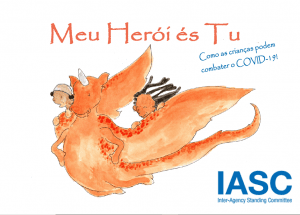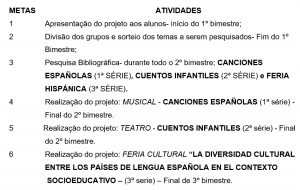ORIGINAL ARTICLE
ROCHA, Anna Gabrielle Amorim [1]
ROCHA, Anna Gabrielle Amorim. The importance of textual genres in the teaching-learning process of Portuguese language. Revista Científica Multidisciplinar Núcleo do Conhecimento. Year 05, Ed. 03, Vol. 10, pp. 18-32. March 2020. ISSN: 2448-0959, Access Link: https://www.nucleodoconhecimento.com.br/lyrics/textual-genres
SUMMARY
The new conceptions of language presented by many researchers in the area of language and the current methodological guidelines of the National Curricular Parameters of Portuguese Language include in their discussions the need to implement new teaching strategies. Based on these new theoretical and methodological perspectives, this work entitled “The importance of textual genres in the teaching-learning process of the Portuguese language”, inserted in the area of concentration of Textual Linguistics, intends to show the importance, in pedagogical terms, of textual genres as an object of privileged teaching in the daily practice of teaching and learning of Portuguese language. For these purposes, it presents the concepts of genres from the perspective of some authors of the area such as Bakhtin (1992), Marcuschi (2004 and 2005), Dolz and Schneuwly (2004), as part of the process of construction of the theoretical framework adopted here. Methodologically, it is configured as a bibliographic research, in a dialectical construction and qualitative approach, from exploratory research. Considering the approach performed, it was verified how relevant the textual genres are in the process of teaching-learning of mother tongue, by presenting themselves as elements responsible for the interaction and constitution of the subject in society and enabling the student to improve their reading competence, textual production and orality, since the study of gender, broadly, allows several approaches with regard to the conception of language.
Keywords: Textual genres, Portuguese language, teaching-learning.
1. INTRODUCTION
The discussions about the difficulties of effecting the teaching-learning process of mother tongue, in this specific case, the Portuguese language, have generated, especially among educators, the need to seek alternatives and/or strategies that help them optimize or minimize such problems. In view of these concerns, the need to rethink pedagogical practices, which for a long time has guided the work of educators in the classroom, is increasingly relevant, so that perspectives can be found and new directions are defined with regard to the study of language.
Among the numerous perspectives that aim to systematize the procedures of teaching mother tongue, the insertion of textual genres as an object of teaching, has proved to be an important ally in this process, since it is believed that these collaborate in the development of language and also, that such activities intend to expand both the reading competence, the capacity of textual production, and the grammatical knowledge of the language.
Based on the new conceptions of language, presented by many researchers in the field of language and the current methodological orientations of the National Curricular Parameters of Portuguese Language, recognizing the difficulties and need to implement new teaching strategies, this work entitled “The importance of textual genres in the teaching-learning process of the Portuguese Language” has as main purpose to show the importance of , in pedagogical terms, of textual genres as a privileged strategy in the daily practice of teaching and learning the Portuguese language.
The interest in this theme occurred after the observations made during supervised internships I (Elementary School) and II (High School), where it was noted that the textual genres, as a pedagogical instrument, are not yet explored adequately and still fail to meet the longings of a teaching based on the development of the students’ communicative skills, or in the scope of reading , speech or writing. In view of this, the following question arose: What is the importance of working the text exploring the different textual genres?
It is based on this question that the present work has as main objective to make a more detailed approach as a way to highlight the need to show the importance of textual genres for teaching and learning Portuguese language. Therefore, it was necessary to explain the different concepts of textual genres from the perspective of the authors who deal with the subject, such as Bakhtin (1992), Antunes (2002), Marcuschi (2004, 2005 and 2008), Dolz and Schneuwly (2004), among others, in order to have an in-depth and detailed view of such concepts to the extent that they are analyzed, given their importance for the study.
It was also intended, as specific objectives, to explain how the use of the most varied textual texts/genres help in improving the reading capacity and textual production of students. And in the midst of these discussions, we also sought to discuss the condition and role of the teacher, understood as responsible for making certain choices and adopting the strategies necessary for the good performance of their students in the classroom.
From this context and assumptions, placing in a prominent role the textual genres, is that the present work develops, and in view of its objectives, takes into account the theoretical contributions that underlie the conceptions of language and the process of teaching and learning the mother tongue. As well as, the guidelines that guide the use of textual genres by teachers that, as a result, reflects on the educational performance of their students.
In this sense, this work is a bibliographic design, since field research was not necessary, because we sought to reflect on the study and teaching through textual genres based only on theoretical foundations of renowned authors who deal with this theme. In addition, it is characterized as a qualitative research, since the main objective is to interpret the phenomenon under observation, in this case, the textual and also exploratory genres because there is an in-depth investigation on the subject and that will serve as a reference for more research that will be directed to the teaching of the Portuguese language.
Due to this methodological approach, the work is organized into 5 fundamental parts. In the first, a brief history and panorama of textual genres is presented, with the aim of highlighting the specificities of the theories and researches about this concept and its relationship with the teaching of Portuguese language, evidencing, soon after, the relevance of the text within this educational process, as well as the influence of textual genres on the reading, orality and textual production skills of students. The last point to be discussed, as part of the theoretical contribution, concerns the choice or selection of texts/genres for the teaching of Portuguese language, emphasizing the role of the teacher in this very significant process. It follows, soon after, the methodological procedures adopted in the execution of the research. Finally, the final considerations are presented, where a general discussion is made about the importance of textual genres in the process of teaching and learning Portuguese language.
2. TEXTUAL GENRES: A BRIEF PRESENTATION
The allusion to the term textual genre, by convention, given its recurrence in everyday life and especially in Portuguese language classes, refers us to the different forms, characteristics and languages of the various texts, whether oral or written, traditional or digital, which are part of communicative relations and human social interaction. In view of this first perception, we take, for example, categories such as: tales, legends, fables, poems, menus, cartoons, comic strips, news, reports, reviews, emails, finally, an endless list, which goes from the simplest to the most complex, with regard to their use and practicality.
However, in addition to this first impression, the study of textual genre and its relationship with communicative and interpersonal human practice has acquired a broader dimension over the years. This is due to the various studies that are presented in the area of language that aim to establish the relationship between theory and practice, that is, it is necessary, first of all, to understand the conceptions of language from a historical, cultural and social perspective, in order to insert, in a practical way, the textual genres as mechanisms of socialization until it is reached its importance as a teaching-learning tool.
Thus, the term gender, which was previously used only as a reference for literary texts, currently takes on a broader dimension. Bakhtin (1992, p. 279), which relates “all spheres of human […] activity to the use of language” and considers that each of these spheres “involves a repertoire of discourse genres”, brings in the midst of these discussions and assertions, a series of studies referring to the theories of language and needs of understanding around the textual genres. Among the statements that gain recurrent notoriety in the works focused on this theme, is the one defended by Marcuschi (2002, p.22) where, according to the author, “verbal communication is only possible by some textual genre”. Which gives the question of gender, in accordance with the two authors, an inexhaustible scope.
In this sense, the textual genres, according to the view of the authors mentioned, are all texts (oral and written) that circulate socially and have the function of effecting the process of communication and verbal interaction between individuals. What also inserts in the context of the discussion, the social function of gender, since it enables interaction and coexistence in society. The genres start to have, from this view, an extremely pragmatic and contextualized character. With this, one is faced with a concept that refers not only to one of the didactic-methodological aspects of portuguese language teaching in the classroom, but to a concept closely related to the constitution of the subject in society, from an interactive activity, effected primarily by language.
Meeting this pragmatic perspective Marcuschi (2008, p.149) presents his definition of textual genres, which, in a view, shows them as “forms of social action”. But, as he himself ponders, the formal definition of genders is a very difficult thing. It is when he proposes that, depending on the meaning in which one observes, textual genres can be: “a cultural category, a cognitive scheme, a form of social action, a textual structure, a form of social organization and/or a rhetorical action”. For him, genders are “historical phenomena, deeply linked to cultural and social life” and constitute “uncontrollable forms of action” that have the function of “ordering and stabilizing day-to-day activities”. Such considerations reinforce the theoretical and practical scope conferred on textual genres, given their need for delimitation and understanding.
Thus, one arrives at the proposition that genders are the natural way in which we use language to communicate to us, that is, it is not possible to speak a word without using a textual genre, so there is no communication without them. Therefore, the work with the notion of gender allows an approach in the most different aspects of the language that, as historical and cultural phenomena, adapt and determine the various communicative situations produced in society. Due to the dynamic and social character conferred on the genre, Antunes (2002, p. 69) states that
The genera are historical-cultural, that is, they are sedimented in moments and in spaces of the life of the communities; that is, each place and every epoch are marked by the predominance of certain genera, which, in this contingency, can appear to remain, change, transmute, disappear; in fact, social groups regulate the conditions of the path that genders perform.
This establishes the close relationship between gender conception and the constitution of the subject, since, within this historical-cultural dynamic that genders are inscribed, they end up determining sociocultural relationships and giving language a preponderant role in the process of human interaction. Reinforcing this intimate relationship, Marcuschi (2008) states that, as social beings, since our constitution, we are involved in a “sociodiscursive machine”, being the textual genres one of the most powerful instruments, because it is of their competence much of our social insertion.
Thus, in the midst of the wide scope, it is necessary to delimit the study on gender, in order to find specific directions to be worked and establish the possible purposes, by presenting it as a mechanism of interaction, and also to place it in the didactic-pedagogical universe as an important teaching-learning tool and its concrete contributions.
2.1 THE TEACHING OF THE PORTUGUESE LANGUAGE IN THE PERSPECTIVE OF GENDER
Given their potential for verbal interaction and their close relationship with the historical and social aspects that constitute the subject, the textual genres present themselves with the necessary requirements for didactic-pedagogical practice related to the teaching of the mother tongue. It is based on the premise defended by Marcuschi where “it is impossible to communicate verbally unless by a genre, just as it is impossible to communicate verbally unless by a text”. (MARCUSCHI, 2007, p.22). Thus, if the textual text/genre functions as a means of interaction, this process tends to be facilitated when it is to work the teaching of the Portuguese language from the perspective of the textual genre.
In his studies Dolz and Schneuwly (2004), they highlight the issue of textual genre, especially those related to the teaching of the Portuguese language, believing that the approach and study of the language should be done through the texts and suggest the use of the different textual genres, whether oral or written in the classroom.
The ideas of these authors on the use of textual genres in the teaching of the Portuguese language converge entirely with the proposal of the National Curricular Parameters (PCNs) of Portuguese language (1998) when presenting the textual genres as teaching tools in the practice of reading and text production and as allies in the teaching-learning process of the mother tongue. In this sense, it is proposed the adoption of a methodology that will unpack the teaching of mother tongue of traditional practice, anchored in the merely normative and conceptual aspect. However, as Stated by Romeu (2010), this methodology that preferentially adopts textual genres in classroom practices does not prevent, nor should it prevent, and should prevent, work with the grammatical elements of the language. On the contrary, the text also functions as a place conducive to the understanding of such elements, depending on methodologies that know how to take advantage of the linguistic potential of the text in use.
Thus, according to the author, the work with gender should be that, in addition to presenting various reading strategies and also textual production, assist in the studies of vocabulary and especially grammar, being here, not precisely a substitution, but rather a reformulation that obtains satisfactory results.
There is now a need to make portuguese language classes, focusing on the use of textual texts/genres, to worry about the effective use of language from a socio-interactionist approach, that is, language as a form or process of interaction of the subject in the most different contexts of which they are part. Based on this, the PCNs, based on this proposal, emphasize that “there is no language in the void, its great objective is interaction, communication with the other, within a social space” (BRASIL, 1998, p.5). This ends up effectively integrating the use of the text with the processes of social interaction within a broad context that encompasses language and its meaning productions.
In view of this proposal, it is now necessary to insert teaching methodologies in a practical way that can ensure that textual genres present themselves as concrete allies in the process of teaching-learning of mother tongue. According to Geraldi (2006) and Possenti (2006), at the same time, language teaching is considered insufficient to try to make Portuguese language classes a significant means of knowledge apprehension. It is therefore necessary to seek alternatives capable of meeting this difficulty.
This change emphasized by linguists would also be the transformation desired by the PCNs, when proposing a methodology, in this case, from the use of textual genres. For this to happen, it is necessary to understand the functionality of the text, understood so far as a primordial element in this process that aims to ensure the mother tongue classes, greater capacity for integration and efficiency.
2.1.1 THE QUESTION OF TEXTUALITY: TEXT AS AN OBJECT OF TEACHING
From the historical perspective, based on the studies of Textual Linguistics, the text is presented, according to Segate (2010, p.01) as the object of study of this recent language science, and as such presents linguistic units and specific properties. The author also states that over time the concept of text needed to be reformulated. This is because “investigating the word or the isolated phrase does not allow us to understand the various linguistic phenomena, because these can only be explained within the text itself”.
In the midst of discussions about a new methodological conception that aims to better perform in the teaching of the Portuguese language, there is, unanimously, the relevance of presenting the text as a primordial element in the teaching-learning process acquired by the student in the classroom. This is what the proposal put forward by the PCNs argues when it sees the text as a unit of meaning and communication. Of course, this applies in a practical way when taking into account factors such as the level of knowledge of each student and their social context, in order to adjust to the series and their personal life.
In view of these attentions given to the text, it is necessary to understand, both in theoretical and practical terms, what exactly this important object of study consists of. According to Koch (2003, p. 31), the text is understood as a
[…] verbal manifestation, consisting of linguistic elements of various orders, selected and arranged according to the virtualities that each language makes available to the speakers in the course of a verbal activity, in order to provide the interactants not only with the production of meanings, but also to anchor the interaction itself as a sociocultural practice.
In this sense, it is understood that the text, as linguistic materiality, exercises its communicative function par excellence and as a verbal manifestation facilitates the process of interaction between the subjects. It is organized in such a way as to establish and generate meanings, that is, if appropriate to certain communication situations in a coherent manner. It is taken into account, as Antunes (2002) points out that what determines or gives relevance to the text are not simply its immanent elements but contextual factors that condition, determine and give it prominence. Hence the need to choose as object of study the text, in its double face of production and reception, recounting the study of the language most important. This is because it considers that “the knowledge of the texts and their forms of occurrence constitutes, after all, part of people’s knowledge about the language and its functioning” (Op. Cit. p. 68).
As for the conditions of production of meanings Wittke (2012, p. 21) emphasizes that “every text is determined according to the communicative interaction established between the producer and the receiver, which presupposes rules, values and norms of conduct, depending on the social roles that the subjects play in society”.
In this aspect, the understanding of the text and its relationship with the teaching and learning process requires a lot of attention, because it is in it that it is deposited, depending on its choice, the expectation of an efficient methodological approach and an instrument that ensures the interaction of its potential reader with the other and with the world around it, prioritizing its competencies , whether manifested by speech or writing.
2.1.2 TEXTUAL GENRES AND READING SKILLS, TEXTUAL PRODUCTION AND ORALITY
Among the main concerns of the pedagogical practice of Portuguese language, due to the results that one wishes to achieve, is the ability to explore the reading skills, textual production and orality of students. To raise these competencies, it becomes, as a rule, an “obligation” on the part of the Portuguese language teacher through his didactic-methodological strategies. This is because, if such difficulties are not overcome through the activities performed in this discipline, consequently these students will have “problems” with the others, which also require, although not in the same proportion, skills in this order.
This didactic planning is based on the orientations of the Curricular Parameters based on the organization of learning situations from appropriate genres for work with oral language and written language and that are appropriate to the different levels of schooling (BRASIL, 1998). In view of these guidelines, it is essential to make the coherent use of practices that will satisfy this longing. The textual genres, more specifically, the various texts that are presented as an object of study in Portuguese language classes, begin to configure, from the interactionist perspective, the most effective tool for reading practices, textual production and orality.
The reading activity, according to Antunes (2003, p. 67), should be an “activity of interaction between subjects”. From this process of interaction, the relations established between author-text-reader come from this process, in which readers trigger their previous knowledge to attribute meaning to what was read, thus being able to understand the intentions, attentive to the marks and clues left by the author. This perspective gives the question of reading not only the possibility of mechanically decoding the graphic signals, but of ensuring, as a reading competence, a global view of the text. It is therefore necessary to privilege, in the act of reading, the ability to understand and interpret, in which students come to integrate their linguistic and communicative skills in their completeness, as much is postulated in the studies of textual genres.
The written skill, according to Lima (2017), plays the role of concrete brand or place of the production of meanings generated by reading. It is in textual production activities that one has a perception whether reading activities have had concrete and/or positive effects. It is necessary, therefore, to observe in these practices the structural elements and linguistic marks related and appropriate to gender and the communicative situation in which the reader/author is inserted. These elements and marks may also be evidenced in orality practices. Allowing the student to develop the most usual language competence. Which, in a way, prepares you for the most diverse circumstances of verbal interaction.
As Lima (2017, p.3) postulates, “this pedagogical practice centered on tripod reading, production and analysis of texts requires a diversification of didactic situations designed for the development of formal oral language and expansion of reading and written skills”. This, of course, considering the type of gender to be chosen, depending on the level of education of the students and the objectives that are intended to be achieved.
In this sense, it is necessary to present, within the pedagogical activities of Portuguese language, possible proposals aimed at studying the language based on the basic units that constitute such teaching, whether through reading practices, orality or textual production.
3. THE CHOICE OF GENRES FOR THE TEACHING OF PORTUGUESE LANGUAGE AND THE TEACHING ROLE
Around all this discussion, which gives textual genres relevance in the process of teaching and learning Portuguese language and recognizing its inexhaustible scope, there is, therefore, the concern of how much or who can be responsible for the choice of such texts, in order to find balance and make didactic practices with these instruments, significant means of education.
According to Marcuschi (2008) it cannot be defined that there are ideal genres for teaching. It is possible, however, to identify generic specimens that allow a progression in the degree of difficulty, starting from the simplest to the most complex. He also stresses his concern that genres are chosen for the understanding of texts and also for the production, cautiously, since there are different skills.
The varieties of textual genres are also considered in the PCNs, and the choice of the specimens to be taught, according to Dias (2012, p. 08), is closely related to the skills of speech and listening, reading and writing. For this, the PCNs suggest gender grouping tables that can be used for guidance in the teaching process. The following is the table:
Table 1: Groupings suggested by the PCNs for the practice of producing oral and written texts
| Oral language | Written language | ||
| Literary | § Song
§ Dramatic texts |
Literary |
§ Chronicle § Short story § Poem |
| Press | § News
§ Interview § Debate § Testimony |
Press | § News
§ Article § Reader’s Letter § Interview |
| Scientific Dissemination | § Seminar
§ Debate |
Scientific Dissemination |
§ Experience report § Scheme and summary of articles or eits § Encyclopedia |
Source: BRASIL, 1998, p. 54.
These groupings of genres are separated according to the desired function, that is, they are chosen separately for oral and written language. For each of the two types of language, genres from the literary, press, scientific dissemination and advertising spheres are selected.
It is therefore up to the teacher to make these choices, attentive to these new perspectives. This becomes a responsibility that requires an effort, because despite being a positive aspect for their classes, the teaching action still needs to overcome criticism related to its performance. In the meantime, Geraldi (2006) criticizes the way mother tongue teaching is found and defends the need for change in the pedagogical practice of the LP teacher.
It seems to me that the most chaotic of the current situation of Portuguese language teaching in primary schools consists precisely in teaching, for students who do not even master the cultured variety, of a metalanguage of analysis of this variety – with continuous exercises of grammatical description, study of rules and hypotheses of analysis of problems that even experts are not sure how to solve (p.45).
These questions about the teaching role become recurrent and are based on discussions that aim to find mechanisms that help him in this process, and it is also up to this professional to be open to these new perspectives. Reiterating these criticisms, around the role of the teacher, Wittke (2012, p.14) points out that,
The teaching action has not been planned and performed through significant activities and permanent verbal interaction, which can place the student in real situations of communication (speaking and writing), which ends up making the language class a mechanical exercise, often devoid of meaning.
From this perspective, the teacher has to exercise the role of mediator, who in addition to proposing differentiated methodologies of reading and textual production, promote activities in order to explore the study of the text and its various genres from the perspective of its functioning and structure, considering the meanings it produces, to make its student competent to recognize them and use them in the most different social places of communication.
In this perspective of achieving the desired result, according to Furlanetto (2007), learning implies complex processes of mediation, guidance, cooperative work, involving human interaction in a complex dynamic.
In view of the above, the study based on textual genres not only helps the process of teaching and learning the mother tongue, but provides and encourages the habit of reading, textual production and orality. Thus, it is up to the teacher, to choose the genres according to the levels of assimilation of the contents by his students.
4. METHODOLOGICAL PROCEDURES
In this topic, we seek to explain the methodological processes that led the research’s journey to its conclusion.
The research is leaning towards the qualitative approach method, which according to Marconi and Lakatos (2011) deals with a research that has as premise, understand and interpret social phenomena inserted in a given context. To this end, it is a bibliographic design, which according to Gil (2002, p. 44),
bibliographic research is developed based on material already elaborated, consisting mainly of books and scientific articles. Although almost all studies are required for some type of work of this nature, there is research developed exclusively from bibliographic sources.
This phase was initiated by the survey of materials already published, such as books, articles, theses, aiming at familiarization to the subject researched, in this case, about textual genres and their importance in the teaching and learning of LP.
Because it is a research with a theme little discussed in the city where the work was developed, this study is also characterized as an exploratory research, which according to Gil (2002, p. 41), has as main objective to provide familiarization with the problem researched, with the purpose of making it clearer. Also according to this author, this type of research has as main objective the improvement of ideas or the discovery of intuitions. In this perspective, the following steps were necessary:
1st Stage – Source Search: This step consisted in identifying the sources capable of providing the necessary answers to solve the research problem. In all, 05 scientific articles were selected, i.e.: Textual genres in Portuguese language teaching; Textual genres: reference for Portuguese language teaching; Textual genres in Portuguese language teaching: experiences in supervised internship; Textual genres for the production of texts written in the textbook and Oral genres and written in school, 04 books: Oral genres and written in school; Textual production, gender analysis and comprehension; About teaching Portuguese in school and Conceptions of language and teaching of Portuguese, as well as readings on websites and electronic magazines.. These are all referenced at the end of this work.
Step 2 – Data collection: This stage consisted of reading the organized bibliographic material, where a lot of attention and focus was required to identify information and data for the research.
Gil (2002, p. 77), postulates that the types of readings of the material can be classified according to the progress of the research. According to him, the first reading is the “Exploratory Reading” which aims to verify whether the work consulted interests the research or not. The second is “Selective Reading”, which determines whether the material actually interests the research is deeper than the exploratory one. Soon after, there is the “Analytical Reading” that is done based on the selected texts and that aims to sort and sumaries the information. And the last is the “Interpretive reading”, this stage of the reading process and is the most complex. It is in this process that one must give meaning to the results obtained with reading. It is necessary to connect the data with the knowledge obtained.
After this stage of reading the materials, we went to the 3rd Stage, which corresponded to the registration of the selected materials. This stage aimed to identify in the works consulted, the contents that interested the research, as well as to make comments about the works and the ordering of the records.
Once this was done, the 4th and last stage was followed by the writing of the text. At this stage, the report of understanding the researched contents was exposed, taking into account the organization and transcription of the analyses obtained in the previous phases as objective of showing the importance, in pedagogical terms, of the textual genres as an object of privileged teaching in the daily practice of teaching and learning portuguese language.
5. FINAL CONSIDERATIONS
From the perspective of renowned authors who work on the issue of language and the teaching-learning process that aim to give teaching new perspectives in an educational context that still requires attention, the insertion of textual genres is essential, since it collaborates for the development of language and functions as a working instrument for Portuguese language teachers. To give relevance to this important teaching tool, supported by the proposals of the PCNs themselves, transforms the textual texts/genres into links of interaction and formation of the subject himself in society.
As a didactic-pedagogical perspective, it was verified through this study that the proposal of use of genders tends to contribute to the improvement of teacher education and performance, since it creates opportunities to relate theory and practice by transforming the theoretical and methodological knowledge seized into effective pedagogical practices. Such practices, as seen, can significantly influence, in thinking about the advantages for the student, in the improvement of reading capacity, textual production and orality through the most diverse textual genres, because they guarantee a dynamic approach and trigger historical and ideological aspects.
Therefore, it is increasingly important to reflect on the theme, in an attempt to find, in addition to solutions and actions that promote meaningful teaching, also means that help both the teacher in training and those who already work, in order to redirect them to efficient practices for their work.
This study can be recommended as a complementary research tool for those interested in the theme, especially those who focus on the tireless need to find alternatives for the better functioning of teaching, in particular, to Portuguese language teachers, who despite the daily challenges, find in their mission to teach the motivation necessary to persist.
REFERENCES
BAKHTIN, Mikhail. Estética da criação verbal. Tradução: Maria Ermantina Galvão G. Pereira. 3.ed. São Paulo: Martins Fontes, 2000.
BRASIL, Secretaria de Educação Fundamental. Parâmetros curriculares nacionais: terceiro e quarto ciclos do ensino fundamental: Língua Portuguesa. Brasília: MEC/SEF, 1998.
CORRÊA, Hydelvídia Cavalcante de Oliveira; SOUZA, Lygia de Lima: Pesquisa e Produção Acadêmica em Letras I. – Manaus: UEA edições, 2018.
DIAS, Laice Raquel. Gêneros textuais para a produção de textos escritos no livro didático. Disponível em: http://www.ileel.ufu.br/anaisdosielp/wp-content/uploads/2014/07/volume_2_artigo_166.pdf. Acesso em: 08 de Abril de 2019.
DOLZ, Joaquim; SCHNEUWLY, Bernand. Gêneros orais e escritos na escola. Campinas, SP: Mercado de Letras, 2004. 278 p. (Tradução e organização: Roxane Rojo; Glaís Sales Cordeiro).
FURLANETTO, Maria Marta. Práticas discursivas: desafio no ensino de Língua Portuguesa. In: CORREA, DjaneAntonucci. e SALEH, Pascoalina Bailon de Oliveira. Práticas de letramento no ensino; leitura, escrita e discurso. São Paulo: Parábola, 2007.
GERALDI, João Wanderley (org). O texto na sala de aula. 4. ed. São Paulo: Àtica, 2006.
GERALDI, João Wanderley. Concepções de linguagem e ensino de português. In:
Gil, Antônio Carlos. Como elaborar projetos de pesquisa. 4. ed. São Paulo: Atlas, 2002.
KOCH, I. V. O texto e a construção dos sentidos. São Paulo: Contexto, 2003.
LIMA, Fernanda Barboza de. Gêneros textuais no ensino de língua portuguesa: experiências no estágio supervisionado. Disponível em: https://www.editorarealize.com.br/revistas/sinalge/trabalhos/TRABALHO_EV066_MD1_SA2_ID1562_23032017225333.pdf. Acesso em: 04 de Abril de 2019.
MARCONI, Marina de Andrade; LAKATOS, Eva Maria. Metodologia Cientifica. São Paulo. Atlas, 2011.
MARCUSCHI, Luiz Antônio. Produção textual, análise de gêneros e compreensão. São Paulo: Parábola Editorial, 2008.
MARCUSCHI, Luiz Antônio. Produção textual. Gêneros textuais: definição e funcionalidade. In: DIONÍSIO, A. P.; MACHADO, A. R.; BEZERRA, M. A. (Org.). Gêneros textuais e ensino. 4. ed. Rio de Janeiro: Lucerna, 2005.
ORLANDI, Eni P. Análise de discurso: princípios e procedimentos. 8. ed. Campinas, SP: Pontes, 2009.
POSSENTI, Sírio. Gramática e política. In: GERALDI, João Wanderley (org). O texto na sala de aula. 4.ed. São Paulo: Àtica, 2006.
POSSENTI, Sírio. Sobre o ensino de português na escola. In: GERALDI, João Wanderley (org). O texto na sala de aula. 4.ed. São Paulo: Àtica, 2006.
ROMEU, Silvanya Suellem de Lima. Gêneros textuais: referência para o ensino de língua portuguesa. Disponível em: http://www.editorarealize.com.br/revistas/conedu/trabalhos/TRABALHO_EV056_MD1_SA15_ID8012_17082016160903.pdf. Acesso em: 04 de Abril de 2019.
Severino, Antônio Joaquim, 1941- Metodologia do trabalho científico — Antônio Joaquim Severino. — 21. ed. rev. e ampl. — São Paulo: Gortez, 2000.
SEGATE, Aline. Gêneros textuais no ensino de língua portuguesa. Disponível em: http://www.revistas.usp.br/linhadagua/article/view/37333. Acesso em: 23 de Abril de 2019.
WITTKE, Cleide Inês. O importante papel do texto nas aulas de língua materna. Disponível em: http://www.ileel.ufu.br/anaisdosielp/wp-content/uploads/2014/06/volume_2_artigo_074.pdf. Acesso em: 24 de Abril de 2019.
[1] Graduated in Portuguese Language and Literature Letters – UEA/2019 Bachelor’s degree in Social Communication/Journalism – UFAM/2013.
Sent: January, 2020.
Approved: March, 2020.





